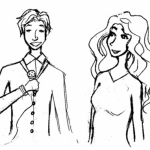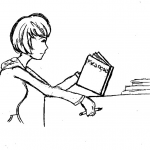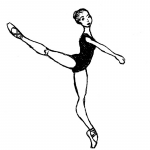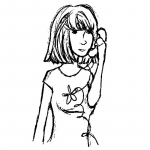5.2 Regular Verbs
The verbs aimer (to like, to love) and jouer (to play) are regular –er verbs in the present tense. This means that when they are conjugated they follow a similar pattern.
Conjugating Regular “er” Verbs
Every verb has two parts: the stem and the ending. The stem is the verb’s main part, it generally remains unchanged as it conveys the meaning. The ending for its part, will change to indicate the subject who is performing the action and the verb tense (past, present or future). For example, in the infinitive (the unconjugated form) the verb aimer is made up of the stem (“aim”) and the ending (“er”).
To conjugate the verb, the first step is to drop the infinitive ending (“er”) and add the ending that is specific to the subject (e, es, e, ons, ez, ent ).
Aimer
The verb aimer (to love, to like) can be used to express preferences or likes and dislikes:
Examples:
J’aime le golf. / I love golf.
Tu n’aimes pas le hip hop. / You don’t like hip hop.
Negation
In French, to negate an affirmative sentence or to write a negative sentence ne … pas is placed around the conjugated verb. Note that the ne changes to n’ before a verb beginning with a vowel or a silent h.
| Person | French | English |
|---|---|---|
| 1st Person Singular | J’ aime | I love |
| 2nd Person Singular | Tu aimes | You love |
| 3rd Person Singular | Il/elle/on aime | He/she/one loves |
| 1st Person Plural | Nous aimons | We love |
| 2nd Person Plural | Vous aimez | You love (formal or plural) |
| 3rd Person Plural | Ils/elles aiment | They love |
Jouer
The verb jouer (to play) is typically used to talk about playing a sport or an instrument, but in French it requires a preposition, as you will see later on.
Examples:
Il joue au football. / He plays football.
Marie et toi ne jouez pas du piano. / Marie and you don’t play (the) piano.
| Person | French | English |
|---|---|---|
| 1st Person Singular | Je joue | I play |
| 2nd Person Singular | Tu joues | You play |
| 3rd Person Singular | Il/elle/on joue | He/she/one plays |
| 1st Person Plural | Nous jouons | We play |
| 2nd Person Plural | Vous jouez | You play (formal or plural) |
| 3rd Person Plural | Ils/elles jouent | They play |
Important Notes
- Don’t forget that when the conjugated verb begins with a vowel, je changes to j’. This elision always occurs when je precedes a vowel or silent h. When elision is made between two words, they are pronounced as one word.
- Four of the six forms (je, tu, il, and ils) in “er” verbs are pronounced exactly the same, although they are written differently. This is why the subject noun or pronoun must be used in French.
- In the plural forms liaison occurs: the “s” of the pronoun is linked to the following vowel sound and pronounced like a [z].
Jouer à
To talk about playing certain sports, we use the verb jouer:
Note that that the noun (sport) must be accompanied by a definite article (le, la l’, les) and as a result the preposition à may require a change (à + le = au, à + les = aux).
Jouer de
We can also use the verb jouer (to play) with the preposition de to talk about playing an instrument:
The preposition de requires certain changes when accompanied by a definite article:
- de + la = de la
- de + le = du
- de + les = des
Exercice 2: Aimer et Jouer
Part A
Conjugate the verbs in the brackets using the correct form in the present tense.
- Nous (aimer) le hockey.
- Vous (jouer) au badminton.
- Il (jouer) au football.
- Tu (aimer) le jazz.
- Je (aimer) le golf.
- Je (jouer) aux cartes.
- Sophie (jouer) au tennis et Jeanne (jouer) au baseball. Elles (aimer) les sports.
Part B
Rewrite the above sentences in the negative. Don’t forget to use ne…pas.
Other Regular -ER Verbs
To conjugate other regular verbs that end in “er”, you follow the same pattern: using the verb stem (after dropping the infinitive ending “er”), you need to add the ending that corresponds to the subject.
Regular Verb Conjugation
verb stem + ending (e, es, e, ons, ez, ent)
For example, ils + danser (they + to dance) becomes ils dansent (they dance).
Exercice 3: Regular Verbs
Review the following list of activities.
| FRENCH | ENGLISH |
|---|---|
| chanter (du karaoké) | to sing (karaoke) |
| danser | to dance |
| écouter | to listen |
| étudier (le français) | to study (French) |
| parler (à la fête) | to speak (at the party) |
| manger (de la pizza) | to eat (pizza) |
| surfer sur internet | to surf the internet |
| téléphoner (à un ami) | to phone (a friend) |
| utiliser (l’ordinateur) | to use (the computer) |
| acheter* | to buy |
* Please note, the e in the last syllable of the acheter stem changes to è for all the conjugations, except nous and vous (j’achète, tu achètes, il/elle/on achète, nous achetons, vous achetez, ils/elles achètent).
Several of the activities are depicted in the pictures below. Write a sentence describing what each person is the pictures below is doing. Don’t forget to conjugate the verb!
- A man sings and a woman observes.
- A student studies French.
- A girl eats lunch.
- A girl dances.
- A student surfs the internet.
- A woman phones a friend.
*
This section includes content derived from Liberté, originally released under CC BY-NC-SA, and Tex’s French Grammar, originally released under CC BY 3.0.







